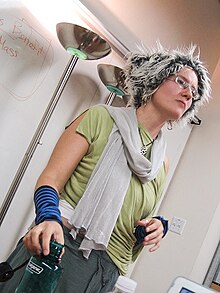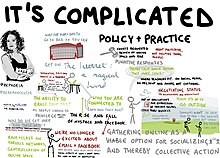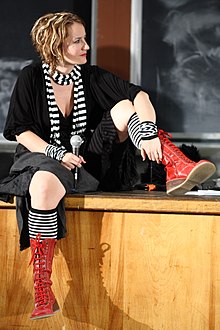danah boyd
She became a participant on Usenet and IRC in her junior year in high school, spending a lot of time browsing, creating content, and conversing with strangers.
She decided to spell her name in lowercase so as "to reflect my mother's original balancing and to satisfy my own political irritation at the importance of capitalization.
[15] In 2008, boyd earned a Ph.D. at the University of California, Berkeley, School of Information,[16] advised by Peter Lyman (1940–2007) and Mizuko Ito.
The project culminated with a co-authored book "Hanging Out, Messing Around, and Geeking Out: Kids Living and Learning with New Media.
Fueled by fear that MySpace was a "digital ghetto", parents of these teens were more welcoming of Facebook's network effects.
[28] In 2013, boyd founded Data & Society Research Institute to address the social, technical, ethical, legal and policy issues that were emerging from data-centric technological development.
[35] Also in 2010, Fortune named her the smartest academic in the technology field[36] and "the reigning expert on how young people use the Internet.
[39] In 2019, boyd received the Electronic Frontier Foundation's Barlow/Pioneer Award for her work as a "Trailblazing Technology Scholar",[40] and gave a keynote highlighting women's situation in the tech industry and specifically the controversies at the time involving the MIT Media Lab.
[41] Boyd has spoken at academic conferences including SIGIR, SIGGRAPH, CHI, Etechm Personal Democracy Forum, Strata Data and the AAAS annual meeting.
[citation needed] She gave the keynote addresses at SXSWi 2010 and WWW 2010, discussing privacy, publicity and big data.
at SXSW EDU 2018[48] and another keynote titled “Hacking Big Data” at the University of Texas at Austin, discussing data-driven and algorithmic systems.
On her website, boyd notes that she attributes her "comfortableness with [her] sexuality to the long nights in high school discussing the topic in IRC".


